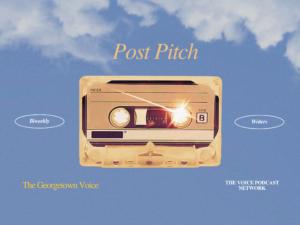When I went home for winter break, I was deeply excited to take time to relax. At Georgetown, we’re constantly dialed in: working to obtain highly coveted straight As while managing commitments to preprofessional clubs, internships, and the next big startup. It’s not necessarily our fault—we’re only attempting to stay afloat in a competitive university culture. I looked to winter break as an opportunity to escape the pressure to forge connections and instead reunite with my mattress topper-less bed, family, and hometown friends.
Upon arriving home, I swiftly received swaths of texts from high school peers, all containing the same essential message: “We should get a coffee/dinner/brunch and catch up!” At first, I was happy to oblige, enthusiastically making plans to reunite. Yet, as the break progressed, I found myself less eager to schedule such plans, especially as I watched myself blow my monthly budget on brief “catch-up” sessions. I dutifully repeated the same anecdotes on each occasion: “Surprise! I switched my major again,” and “I really love D.C., but I hate that Georgetown doesn’t have a Metro stop.” I felt my eyes glaze over as acquaintances listed off the names of friends that I would promptly forget when I left. Networking culture and its inherently draining format had unwillingly seeped into how I carried myself through conversations and interactions with others.
“Networking” has long been a corporate buzzword. We picture Wall Street men in pinstripe suits, handshaking their way through conferences filled with meaningless small talk. At Georgetown, however, networking is more subtle, quietly imposing its influence on Hoyas. It looks like joining a club with a vast alumni network, scheduling dinner plans with a family friend that runs a law firm or forming a less-than-genuine connection with a professor. And this phenomenon extends beyond the Hilltop; Duke University even touts a networking program titled FLUNCH (a portmanteau of “faculty” and “lunch”) designed to “encourage student-faculty interaction outside the classroom.” With every club, every FLUNCH, and every dinner, we become further immersed—someone else’s connections become your connections. Our brains become wired to hang out simply to build that acquaintance for a future, more selfish gain.
The ability to network has become a necessity for entering the workforce; CNBC reported in 2019 that between 50 and 85 percent of jobs are filled through networking. Universities encourage high school students to build LinkedIn profiles to boost their chances of employment and college admission. College students are pressed to pursue their future career paths as early as freshman year. At Georgetown, many of the most popular clubs are preprofessional or consulting clubs—resume-stuffers that also boast some of the most competitive applications on campus.
And now, networking culture has seeped its way into our personal lives. Though we don’t always plan coffee chats with “opportunistic” intentions, we subconsciously follow the routine that networking requires. We schedule plans out of obligation, a sense of personal duty that we feel to keep others in the loop of our lives, potentially for something bigger down the line. We are content with spending more money than we intended because the inherent configuration of a meal, stationed directly across from one another, necessitates the “catch-up” format that we have been conditioned to believe facilitates connection. In short, we carry out our conversations with individuals close to us in the same way we might interact with a boss or a potential employer. The design of a coffee chat reduces our one-on-one interactions to bouts of bland, repeated, small talk about, say, your major or the D.C. Metro system—we catch up, then swiftly move on with our lives.
Ultimately, we have lost track of what it means to spend valuable time with other people. Networking culture governs the way that we make plans, spend money, and converse; its format is designed to keep potential close friends at arm’s length by limiting interactions to annual catch-ups and coffee. If we break from this culture, we can form new, authentic friendships with our acquaintances and even strengthen our existing ones.
Straying from this networking model of friendship, I look to excursions to museums, cooking nights, trips to flea markets, and movie watch parties as some of the most fulfilling times I’ve spent with friends. It is during these moments I’ve also discovered exciting commonalities and experienced the most side-stitching laughs with companions. College students have become too embarrassed or too obsessed with forward progress to simply “hang out” at home. Yet, the inauthentic alternative of coffee and meals can’t be our sole means of catching up or maintaining connections. Activity-based experiences, or even quiet leisure time—sans the pressure of sitting directly in front of someone, constantly filling dead air with words—can make friendships feel easier.
Shared memories often become sources of hearty conversation and common interest, quashing the anxiety that comes with the false need to find an ambiguous thing in common with peers. We’ve all experienced friendships where you and another individual just seem to “click” regardless of immediately shared interests. Though the networking culture argues otherwise, these friendships can exist meaningfully without frequent chit-chat.
Of course, not all of our friendships are defined by networking culture, nor is it inherently harmful to maintain relationships or want to “catch up” with individuals toward the edge of our friend peripheries. We’re friends with people because they make us feel full—because we feel comfortable and content when we spend time with them. Coffee chats aren’t necessarily bad, and if that feels like the best means of preserving a friendship or connection you care about, then go for it! Yet I believe that we can develop our relationships into bona fide friendships if we examine the way we interact with them more critically and strive to spend our time together more authentically.
Living within a one-mile radius of a Compass Coffee, a Blue Bottle, and an L.A. Burdick, I certainly understand the appeal and convenience of a GCal’d coffee chat. But I encourage you to be spontaneous, to get out there—invite someone to check out that new market you’ve seen online, or text a new friend from class—and break from networking culture when you can. Relationships can be more natural and meaningful when we strive to build them on more than just a pair of six-dollar coffees.





